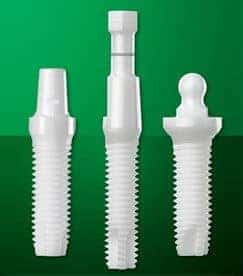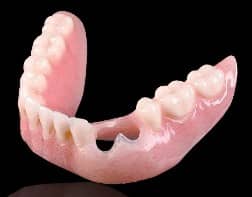I recently had a Maryland Bridge placed, but it turns out I’m allergic to it. There’s not really enough space there for a full-sized implant, so my dentist is suggesting we take out the adjacent tooth and put a large implant crown there to replace both teeth. I know he’s the dentist but won’t that look weird? Do I have other options?
Melissa
Dear Melissa,

Zirconia is metal-free and dubbed “ceramic steel”
I couldn’t decide whether I wanted to laugh or cry when you told me your dentist’s solution. Yes, he’s the dentist, but you will not be happy with this solution. He sounds like your typical dentist who is good for bread and butter dentistry but hasn’t invested a lot of time learning about the more advanced procedures. He certainly hasn’t taken an interest in any cosmetic dentistry or that suggestion would have never come out of his mouth.
About 10% of the population have allergies to the alloy used in etching a Maryland Bridge. You seem to be in that group. You can have a dental implant done, but not the way your dentist is suggesting. A better solution would be to remove the adjacent tooth and still have a single dental implant placed, but use it to support two porcelain crowns. This will allow your smile to look natural without needing additional space by the roots.
Metal Free Dental Implants
Typically, dental implants are made from Titanium. These are highly biocompatible and have been used for years in things like dental implants and hip replacements. There haven’t been many cases of people proving to be allergic to the titanium. It’s has a great proven track record with dental implants as well.
Given your allergic reaction to your bridge, I’m also going to tell you about the zirconia option. That now make metal-free dental implants using zirconia. These are very strong and have been nicknamed “ceramic steel”. Because there is no metal, there is no worry of a metal sensitivity. The only downside is these haven’t been around as long. There is no reason to think they won’t be as durable over the course of a lifetime as their titanium counterparts, but there hasn’t been enough usage to give evidence either way.
I’d talk to a good implant dentist and see what they suggest.
This blog is brought to you by Atlanta Periodontist Dr. David Pumphrey.









